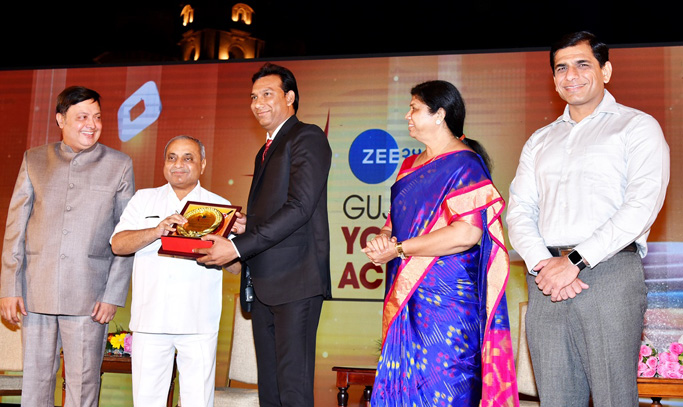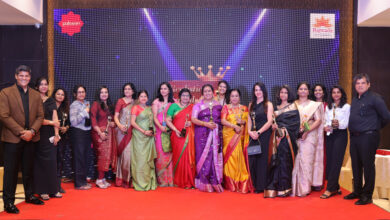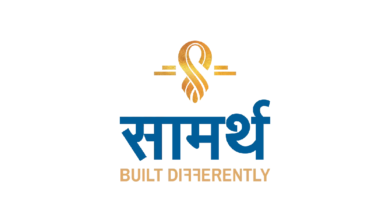Rs 2500 PM to Rs 100 cr a year, how this first generation entrepreneur built a dairy empire!

Vastu Ghee, the brand of Shree Radhe Dairy Farm and Foods Pvt Ltd was a product of a small dairy spread over 350 sq ft in Surat before it gained a pan-India presence. Today as the brand prepares to make inroads in the international market, Founder of Shree Radhe Dairy, Bhupat Sukhadia, talks about the company’s stellar rise from humble origins.
1. Tell us about your journey as an entrepreneur.
I am a farmer’s son and after my post graduation worked in the dairy industry for a starting salary of Rs 2500. I am a first-generation entrepreneur so when I left my job to set up my venture it raised many eyebrows. Giving up the relative safety of a job to start a business may have seemed suicidal but I always wanted to be a businessman. Entrepreneurship appealed to the Gujarati in me. Since I had seen the working of the dairy industry at close quarters, it was an obvious choice. In 2010, I came to Surat and set up a dairy in a 350 sq ft area and today it has grown into Shri Radhe Dairy Farm and Foods Ltd spread over 35000 sq ft with a turnover of over Rs100 crore so far.
2. What was your biggest challenge as an entrepreneur?
Setting up a business is not easy and there are many challenges in terms of finance, infrastructure, manpower, market etc. Since I set up Shree Radhe Dairy, finance has always been the main challenge. It was more so initially, but as the business progressed, the challenges eased but did not end. Since we were new players in the market with a new product and were still building up a brand, we were not given credit, but we were expected to give credit to our clients. This meant we had to sell our products but had to wait for more than two months for the payment. However, we had to pay the suppliers in advance since we were a new company. We then took help of an expert who told us to seek advance payment. Some companies had been in this business for over two decades and never sought an advance from their clients for the products they sold. So, it seemed impossible for a seven-year-old company like ours to demand an advance payment. However, I believed in the quality of my product. Some clients promised to pay us in a fortnight when the usual norm was 2 to 3 months. But we stuck to our demand as we knew the quality we brought to the table. Quality speaks for itself and ours did too. Since then, we have always sought advance payment for our products. This has helped us considerably address the problem of finance.
3. Many aspire to set up a business but few succeed. What is the secret to being a successful entrepreneur?
There is a huge gap between aspiration and execution. That gap can only be filled with hard work. These days young people aspire to get the best education to get the best jobs. How many want to be entrepreneurs? They may occasionally think about it, but few are willing to put in the grind that entrepreneurship demands. The entrepreneurship journey is a frustrating one with several challenges that offer innumerable rewards to those who stick to it and work hard. A job is a comfort zone, entrepreneurship isn’t. Most successful entrepreneurs are often humble students. When I started my business, I got in touch with an organisation that trained entrepreneurs in developing a vision to take their business further. During the training, I met many other entrepreneurs who were successful yet had come to learn. In fact, I was among the youngest of the lot. If you plan to be an entrepreneur, it is important to embrace a love for lifelong learning.
4. Where do you see your company in a decade?
We began as a dairy operating from a 350 sq ft area and now have a plant spread over 35,000 sq ft. We sold our products in Surat then expanded to cover Ahmedabad and Rajkot and eventually to Rajasthan and Maharashtra. Today we have a pan India presence. We plan to export our products to at least six countries by next year and are coming up with a host of new product launches, including cheese, paneer, flavoured milk etc. We intend to have a turnover of over Rs 200 crore in a year, and by 2030 we plan to be among the top 5 FMCG dairy brands in India. An IPO is also part of our plans.
5. You are a company that is closely associated with animal husbandry. What are the challenges facing the sector?
One of the main challenges before the sector is the rising inclination of farmers towards Jersey cows instead of Desi cows. The milk production of a Jersey cow is almost thrice that of a Desi cow and the latter is also high maintenance. Hence, it is understandable why more farmers are inclined not to keep desi cows. But, despite low milk production, the milk of a desi cow is far more beneficial and we need to provide encouragement and support to farmers to nurture Desi cows. It is also important from a biodiversity point of view.
6. You have also set up the Vastu Charitable Foundation. What does it do?
Our vision involves System, Humanity and Contribution. Everything we do has to fit into all or one of these categories. The Vastu Charitable Foundation is an extension of this. We don’t look at our business as a mere profit-generating entity. We see it as something that aids in nation-building, generates employment and helps others. The foundation has been set up for our CSR activities and over the years, we have funded education and food for poor children, the elderly and others. During Covid, we distributed ration kits to over 100 families in Surat and ghee for Covid warriors. We also run a gaushala and help other gaushalas that are struggling to take care of the animals under their care.






